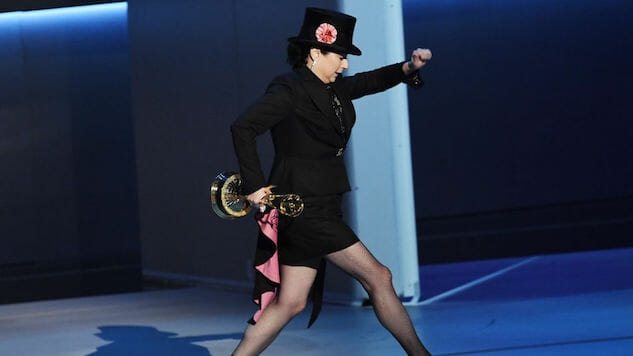The 10 Biggest Emmy Winners and Losers
Header photo: Kevin Winter/Getty Images
Long before it was over, we started calling the 70th Emmy Awards the “Breakneck Emmys,” and in terms of keeping the festivities to a tight three hours, the Oscars could learn a thing or two from Monday night’s. (As presenters Aidy Bryant and Bob Odenkirk pointed out, in one of the night’s best bits, stilted banter is one of the most excruciatingly slow-paced conventions of the format.) But in spite of the rapid-fire pacing, a fair amount of cursing—Chrissy Teigen telling husband John Legend, ‘We got it, you a fucking EGOT” was a highlight of the night—and a few genuine surprises (the TV Academy’s love of Godless, for one), the Emmys struggled yet again to feel fresh in a fast-changing TV landscape. We break down the night’s winners and losers. Read the full list here.
Winner: Drawing Attention to Diversity

Addressing at least one of the elephants in the room (this is a year of many, many elephants), the ceremony kicked off with Kate McKinnon, Sterling K. Brown, Kristen Bell, Kenan Thompson, and Tituss Burgess announcing that the diversity problem in Hollywood has been solved. After all, Sandra Oh is the first Asian actress to be nominated for a lead in a drama. Our work here is done. “It’s an honor just to be Asian,” Oh deadpanned. The tongue-in-cheek number openly mocked Hollywood’s tendency for self-congratulation: “From democrat to liberal democrat, this room is so diverse,” Brown belted. It even had the “One of Each” Dancers. The joke is, of course, that nothing is solved. Sure, the nominees and presenters were diverse. But this is not a problem that can be fixed in one Emmy cycle. Its roots are deep. But, as we all know, the first step is admitting you have a problem. —Amy Amatangelo (Photo: Kevin Winter/Getty Images)
Loser: Rewarding Diversity

Though co-hosts Michael Che and Colin Jost needed to call in reinforcements from Saturday Night Live to keep the telecast’s engine running, the former had a point when he quipped, early in the night, “Six awards, all white winners. One lady won twice.” (That “one lady” was The Marvelous Mrs. Maisel’s Amy Sherman-Palladino, who won for both writing and directing for a comedy series.) There were bright spots, of course: Filipino American Darren Criss’ Emmy for The Assassination of Gianni Versace, Regina King’s surprise win for Netflix’s Seven Seconds, Thandie Newton’s much-deserved award for her role as Westworld’s Maeve, and the overdue triumph of RuPaul’s Drag Race in the reality-competition category. In the main, though, the Emmys’ commitment to diversity remained mostly, well, performative—the subject of musical numbers and pre-taped gags more than the central theme of the night’s honors. After all, the two big winners, Maisel and Game of Thrones, are two of the whitest shows on television. —Matt Brennan
Winner: The Marvelous Mrs. Maisel

Amazon Prime becomes the first streaming service to win Outstanding Comedy Series with Sherman-Palladino’s story of a housewife-turned-standup in 1950s New York, and Emmy voters’ love for Maisel was as resounding as the title character’s laugh: For lead actress Rachel Brosnahan, the series’ dazzling, livewire core; supporting actress Alex Borstein, with a winning shimmy in the aisle; and Sherman-Palladino herself, in her trademark top hat and tales, showing us that the series’ zaniness—whatever you may think of it—is entirely her own. P.S. which Netflix executives do you think lost their jobs since both Amazon and Hulu beat them to the top of the Emmy heap? —Matt Brennan (Photo: Amazon Prime Video)
Loser: Atlanta

Despite an appearance by Teddy Perkins, the second season of Donald Glover’s Atlanta proved too unorthodox for the TV Academy: Despite picking up two awards for Glover last year (as lead actor and director of a comedy series), Robbin’ Season came up empty from eight nominations last night. (It did earn two Emmys in the crafts categories, and one for guest actor Katt Williams.) It’s a shame, too, considering that Season One—much more in line with Emmy voters’ cautious tastes—lost out to a subpar season of Veep. With Maisel poised to become the next multi-year winner in a category known for them, might Outstanding Comedy Series become Glover’s white whale? (My guess is he doesn’t much care, but still.) —Matt Brennan (Photo: FX)
Winner: Saturday Night Live
Saturday Night Live was the literal winner, picking up its millionth win for Variety Sketch series. (Do you think it’s the only sketch show the voters watch?) And, like Saturday Night Live, when the sketches were good, they were very, very good. (As you’ll read below, when they were bad, they were horrid.) “Reparations Emmys” saw Che giving out Emmys to, among others, Marla Gibbs for The Jeffersons, Jaleel White for Family Matters, and Kadeem Hardison for A Different World. Like the best sketches, it was hilarious while offering a skewering commentary on the television industry.
This was executive producer Lorne Michael’s first time producing the show, and he’s experienced in keeping things on schedule. So the order was reversed. The nominees were announced, then the presenters came out and did their banter and then the winner was announced. It kept things moving at a rather clipped pace. There were no montages of the year in television—if your favorite show wasn’t nominated, it was nowhere to be seen—or other time fillers. —Amy Amatangelo (Photo: Will Heath/NBC)
Loser: Saturday Night Live

My husband weaved in and out of watching last night, and at the end he asked, “So, were Colin Jost and Michael Che the hosts or was Saturday Night Live the host?” Exactly. Often, the Emmys just played like an extended version of the late night sketch comedy, although without any political commentary. Was there a cast member past or present who didn’t present? Could we have subbed Issa Rae or Yvonne Strahovski or Keri Russell in for one of them? Or couldn’t they have picked a presenter from a beloved show that wasn’t nominated? (One Day at a Time immediately comes to mind). Of note: SNL alum Jimmy Fallon, whose NBC series was not nominated for Variety Talk Series, was nowhere to be seen.
From the jump, we knew Jost and Che wouldn’t be the best Emmy hosts. Their shtick only works intermittently on Weekend Update, which Michaels seemed to know—which explains why he buttressed them with so many not-ready-for-primetime players. Not one joke from their opening monologue was memorable. And some of the bits were painful. Painful! The Maya Rudolph / Fred Armisen sketch was just plain bad. But that didn’t stop the show from repeatedly going back to it, and each time with them eating more food. —Amy Aamtangelo (Photo: Kevin Winter/Getty Images)
Winner: Prepared Speeches

“I only have 37 seconds and I wrote this 43 years ago.”
That was Henry Winkler’s joyous opening remark as he won his first Emmy for his role on HBO’s Barry. It’s hard to believe Winkler, a beloved television fixture, had never won before. But the Fonz was not going to throw away his shot. His speech was ebullient and his closing note that his kids could go to bed now because “Daddy won!” was one of the more hilarious moments of the night.
Know who else came prepared? Director Glenn Weiss, who used his acceptance speech after winning an Emmy for directing The Oscars to propose to his girlfriend. “You wonder why I don’t like to call you my girlfriend? Because I want to call you my wife,” he said as the audience gasped with delight. Thankfully, she said yes. I don’t want this to start an award show proposal trend, but kudos to Weiss for using his big moment to create another big moment.
Joe Fields and Joe Weisberg, who won for writing the series finale of The Americans, have had six seasons to think about exactly who they wanted to thank and they remembered everyone, including the FX publicists who promoted their show and the TV critics who supported it. —Amy Amatangelo (Photo: Kevin Winter/Getty Images)
Loser: Unprepared Speeches

Look, maybe you thought there was no way you would win. But let me tell you something: If you’re nominated, you have a one in five (or six, or seven) chance of walking home with a trophy, and that’s 100% more of a chance than I have of winning. So write something down. Have a plan. Take notes. Rehearse. Practice in the mirror. Don’t get up there and act like you had no idea this was even possible.
Merritt Weaver, who is fabulous and wonderful, was so flabbergasted when she won in 2013 for Nurse Jackie that she only said, “Thanks so much. Thank you so much. I’ve gotta go. Bye.” It was a cute (Oh look! She forgot to thank Edie Falco!) and memorable moment. But she’s had five years to think about what she might do the next time she won and Weaver still seemed utterly flabbergasted. “I hope you don’t mistake my fear for a lack of gratitude,” she said. This time she had written something down but acknowledged, “I came prepared and it’s bombing already.” —Amy Amatangelo (Photo: Kevin Winter/Getty Images)
Winner: Game of Thrones

I’m not saying Game of Thrones is the worst of the seven series nominated for Outstanding Drama, but it certainly won for its worst season to date, against The Crown’s great leap forward and one of the best final seasons of all time (The Americans, natch). Admittedly, the rest of this year’s crop was pretty weak; This Is Us, Westworld, and Stranger Things all suffered sophomore slumps in one way or another. Even so, HBO should feel like it stole something. (Peter Dinklage, too.) This is a lazy prize given to subpar work on a series whose halcyon days are far behind it. For me, it was the disappointment of the night. —Matt Brennan (Photo: HBO)
Loser: The Handmaid’s Tale

I almost listed my belovedThe Americans here—for one of the best TV performances (Keri Russell) and one of the best TV dramas of the decade to go unrecognized by the TV Academy is a travesty—but all things considered, it did better last night than I dared to dream. (Plus, Buffy and The Wire were blanked by the Emmys. The snub club isn’t a bad one to be in.) I’m over the moon for Joe Weisberg and Joel Fields, who won for writing the exquisite, excruciating series finale, “START,” and Matthew Rhys, whose long-awaited award for lead actor finally came, if perhaps a season or two later than I’d’ve liked.
No, the real loser of the 70th Emmy Awards—in a surprise (at least to me) that doomed my predictions to disaster—was The Handmaid’s Tale. Whether Emmy voters agreed that the second season introduced a handful of insoluble problems, thought the subject matter too bleak, or simply fled for the safe terrain of Game of Thrones (ineligible in 2017), the winner of five Emmys last year, including Outstanding Drama Series, came up completely empty on Monday night. It’s hard to see how another Game of Thrones vs. Handmaid’s Tale in 2019 goes any different. —Matt Brennan (Photo: Hulu)
Amy Amatangelo, the TV Gal®, is a Boston-based freelance writer, a member of the Television Critics Association and the Assistant TV Editor for Paste. She wasn’t allowed to watch much TV as a child and now her parents have to live with this as her career. You can follow her on Twitter (@AmyTVGal) or her blog .
Matt Brennan is the TV editor of Paste Magazine. He tweets about what he’s watching @thefilmgoer.








































